6. The Cinematic Homages
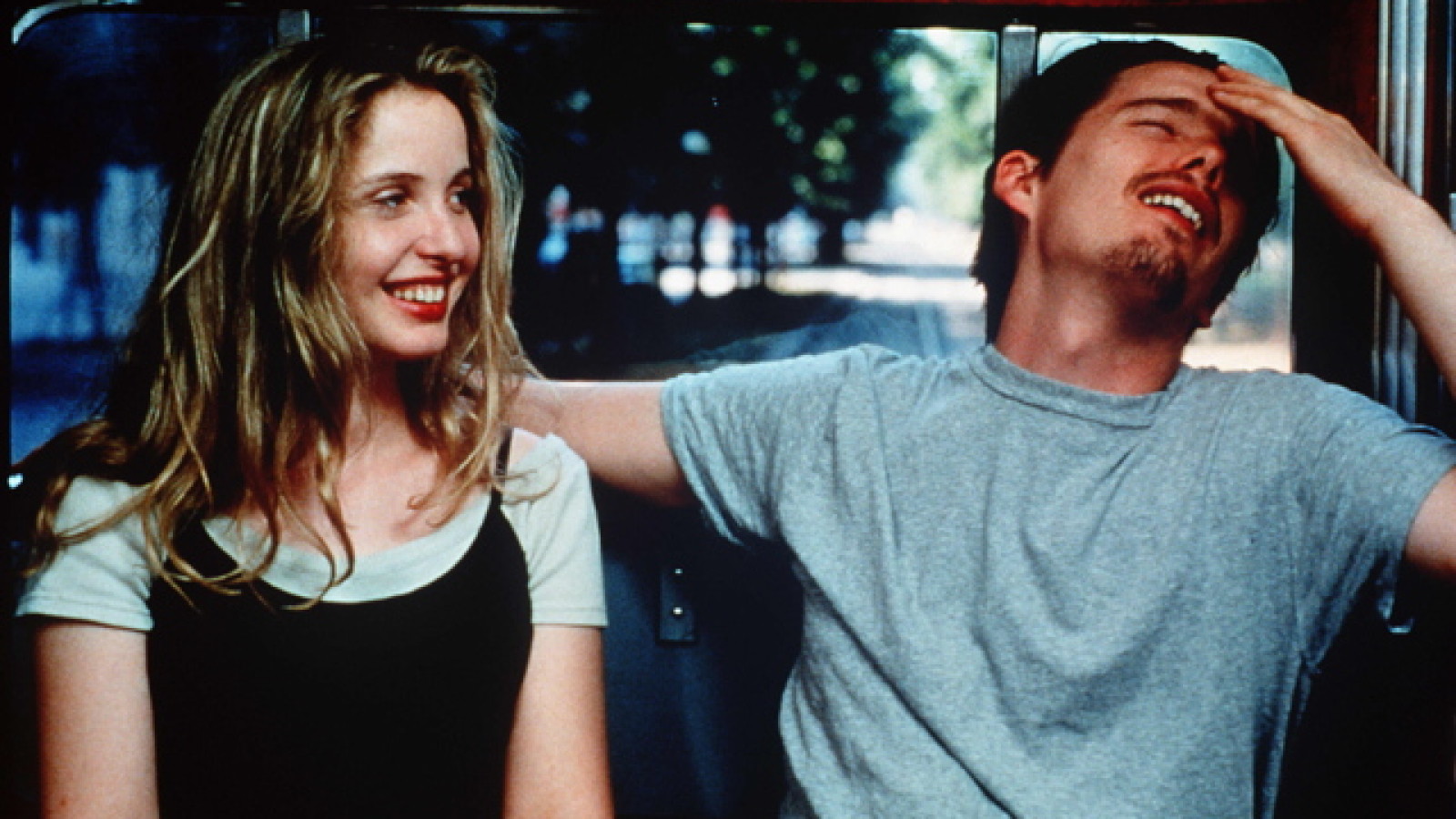
This article has already mentioned the trilogy’s homages to films such as The Third Man and Journey To Italy, but there are many more that are part and parcel of its DNA.
One such debt has to be given to the excellent films of Eric Rohmer, who in his fables and moral tales, always looked to examine the infinite machinations of the heart. His films are famously talky, yet they used idyllic French locations in order to serve as a metaphorical backdrop to his character’s whims. The walk-and-talks of the Before Trilogy would do him proud.
Yet there are many many more references too: in Before Sunrise, the chat across the pinball machine refers to Godard’s My Life To Live; the boat that they get on across the river seine in Paris in Before Sunset recalls the flashback sequence in Casablanca; and in Before Midnight, when we realise that Jesse is still somewhat as pretentious as ever, he talks about his idea for a novel where all the characters are linked by the fact they have seen On The Waterfront.
Some are subtle, some are quite obvious, yet these cinematic references the trilogy draws on shows that it is part of a great cinematic tradition. Additionally, because it is on paper such a basic concept, it celebrates the idea that ordinary people can live, at least every now and then, like those in the movies; making it an idealistic and romantic trilogy that everyone can relate to.
7. The Brilliant Performances
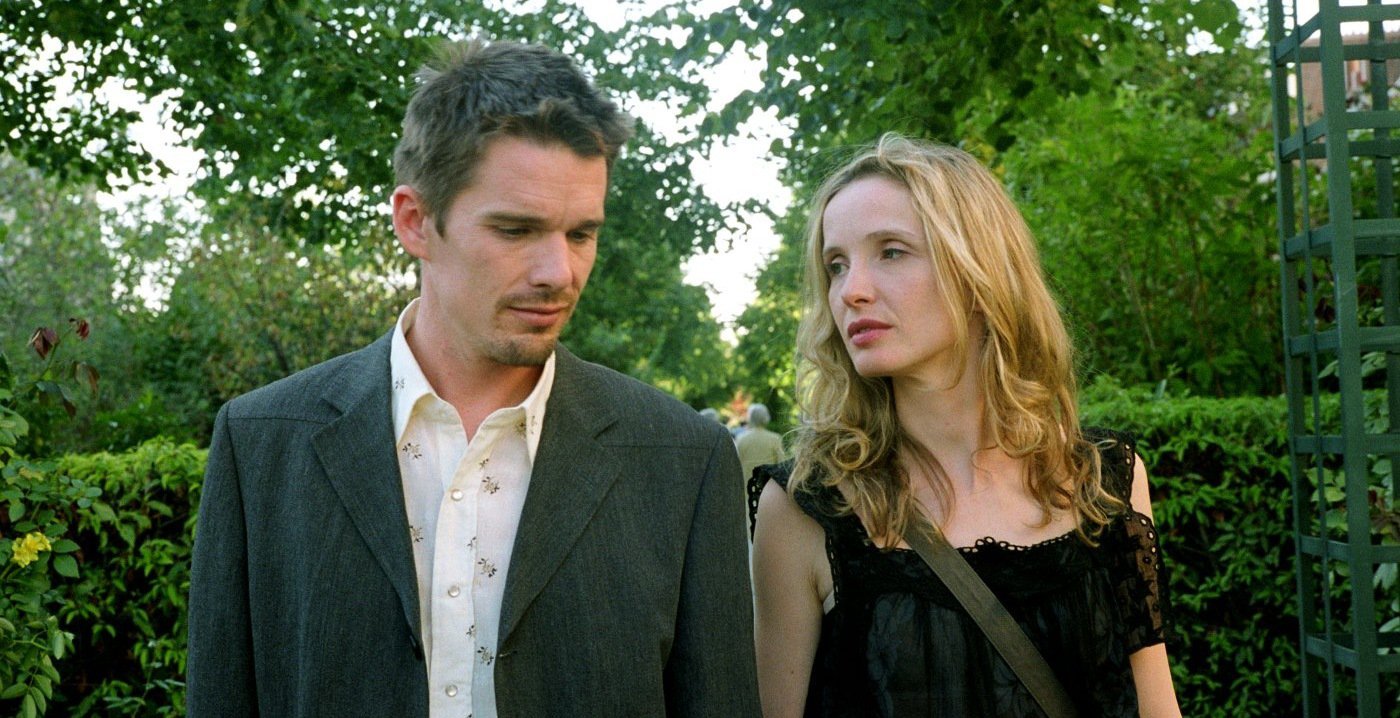
No great film exists on his direction or screenwriting alone; it has to be elevated into the status of greatness by the magnetism of its performers. The Before Trilogy does exactly that, using Ethan Hawke and Julie Delpy as the perfect match to play the star-crossed lovers.
Ethan Hawke is a rare find in the movie world; he moves between indies such as Maggie’s Plan and genre entries such as Sinister at will — seeming equally convincing in both. Yet he seems most at home, and most expressive, when he is playing a fictionalised version of himself.
This is most apparent in the Before movies when he plays upon the dolt, idealistic American abroad with ease. In the hands of other actors, his sell to Céline to get off the train with him may came across as creepy; his novel to win her back as narcissistic; his dinner conversations in Before Midnight as grating. Yet in the hands of Ethan Hawke, this all comes across as rather charming.
Julie Delpy, likewise, plays an excellent variation upon herself. Known hitherto as a French bombshell, she subverts audience expectations by criticising the way the media portrays French women, thus creating a character that can match Jesse’s fabulations with ease.
Additionally, Delpy is host to the best scene in the entire trilogy, with her “If there is any kind of God” speech, something that expertly underpins the philosophical schema of the entire endeavor. Without Delpy’s expressive demeanor and facial expressions, this entire series could’ve been a disaster.
8. The Brilliant Cinematography
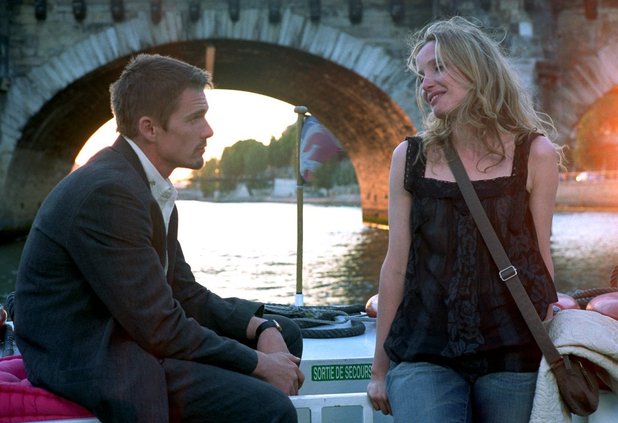
One of the most underrated parts of the Before Trilogy is its excellent cinematography, which in its unobtrusive fluidity make it the perfect symbiosis of form and content. From the medium shots that litter the original to the steadicam brilliance of the sequel, featuring a remarkable 11 minute shot, to the static car scene in Before Midnight, Linklater has always used the best cinematographers to elevate his trilogy into high art.
Yet he knows when to hold a shot in a simple frame, and when to make it visually interesting. We have the delightfully awkward static booth shot in Before Sunrise, as both characters pretend not to look at the other, or the ensemble dinner sequence in Before Midnight, or the flat scene in Before Sunrise, as the camera simply focuses on Julie Delpy dancing and telling an anecdote about watching Nina Simone. It is through choices like these that the exquisite balance between movement and stasis is created.
When the characters are moving there is a sense of forward motion, a shared aim, a goal or destination; yet when they are static; think the boat scene in Before Sunrise, or the argument in Before Midnight; they are coming to head about the frustrations in their own life, or about to get more physically intimate. For a trilogy that loves to talk and talk and talk, it also knows exactly when to shut up and let the camerawork speak for itself.
9. The Lack Of Mediocre Entries
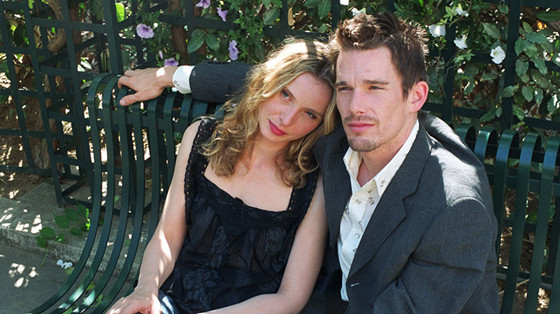
The Godfather Part III. Back To The Future III. Die Hard II. Ocean’s Thirteen. Alien III. Matrix Revolutions. What these trilogy entries have in common is that they somewhat ruin the purity of the other franchise films by being mediocre.
To be perfectly honest, if Alien III was on a par with the other two films in the Alien trilogy, then this would be a completely different article indeed. This is where trilogies such as The Lord Of The Rings — which being based on a book, had it easier — and The Before Trilogy really shine. There is simply not a mediocre entry between any of the films.
The easiest way to gauge this is by looking at the respective Rotten Tomatoes of each entry, with each film ranking very high indeed. Before Sunrise has a remarkable 100%, Before Sunset 95% and Before Midnight 98%.
This is consistently better than the Lord Of The Rings, The Godfather, Three Colors Trilogy (whilst the other two got 100%, the White installment got 90%), and even the Dollars Trilogy. Therefore, if we are talking in terms of pure Rotten Tomato numbers, the statistics show that The Before Trilogy is quite easily the best ever made.
10. The Complicated Depiction Of Love
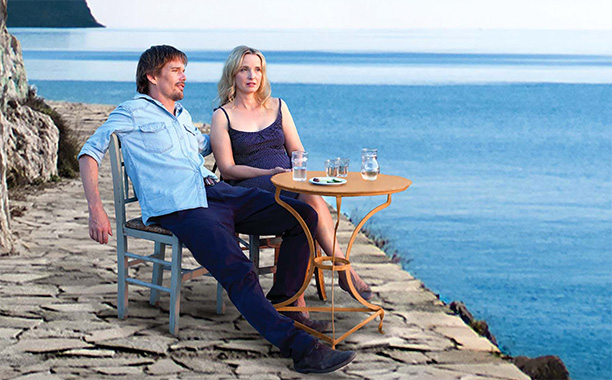
Love can be sneaky. In its first incarnation it can be very simple. You have met someone who is indescribably witty and beautiful and you, for sure, want to spend the rest of your life with that person. Yet once you have to return to the real world, with its attendant jobs, stresses, and entanglements with other people, then it can be very complicated indeed.
Nothing gets it quite so right as the Before Trilogy, with its three different stages of love, works as the perfect cinematic representation of how relationships exist not only through idealism but also a lot of hard-work.
The first film doesn’t dig too deep into these affairs, but the arguing German couple on the train seem to foreshadow the second two films extremely well. Jesse and Céline make fun of them, ironically not realising that this is who they will inevitably turn into by Before Midnight, where a potential sex scene suddenly turns into a raging, no-holds barred argument.
There was immense sacrifice on behalf of both of them after Jesse missed his plane in Before Sunrise. There’s other people’s children, the ex-wife, Jesse’s potential extra-marital affairs, the balancing of work and love, and simply getting on each other’s nerves.
Yet because we can remember the idealism inherent in the first film, or the aching pain that turned to love in the second one, its evident that it is worth it in the end; something that Jesse tries to bring back in his humorous conversation by the sea-side bar at the end of Before Midnight.
Love is complicated, especially over time, but with enough hard work, a plateau can hopefully be reached. In the case of Jesse and Céline, the jury still may be out — they may be divorced in film four — but that only plays to the trilogy’s strength that it can seem to both idealise and criticise romance in almost the same breadth. No other triptych has ever done it quite so skillfully.
Author Bio: Redmond Bacon is a professional film writer and amateur musician from London. Currently based in Berlin (Brexit), most of his waking hours are spent around either watching, discussing, or thinking about movies. Sometimes he reads a book.